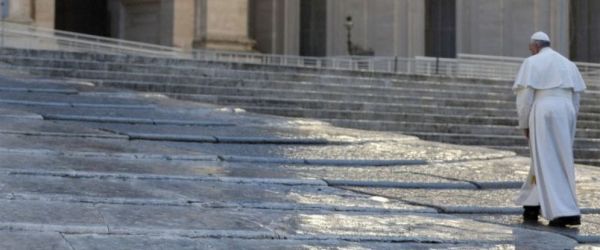In today’s liturgy, the Gospel recounts Jesus’ first sermon in his home town, Nazareth. The outcome is bitter: instead of receiving approval, Jesus finds incomprehension and even hostility (cf. Lk 4:21-30). His fellow villagers wanted miracles and prodigious signs rather than a word of truth. The Lord does not perform them and they reject him, because they say they already knew him as a child: he is Joseph’s son (cf. v. 22), and so on. Jesus therefore utters a phrase that has become proverbial: “No prophet is acceptable in his own country” (v. 24).
These words reveal that Jesus’ failure was not entirely unexpected. He knew his people, he knew the heart of his people, he knew the risk he was running. He took rejection into account. And, so, we may ask ourselves: but if it was like this, if he foresaw a failure, why did he go to his home town all the same? Why do good to people who are not willing to accept you? It is a question that we too often ask ourselves. But it is a question that helps us understand God better. Faced with our closures, he does not withdraw: he does not put brakes on his love . Faced with our closures, he goes forward. We see a reflection of this in parents who are aware of the ingratitude of their children, but do not stop loving them and doing good to them, because of this. God is the same, but at a much higher level. And today he invites us too to believe in good, to leave no stone unturned in doing good.
However, in what happens in Nazareth we also find something else. The hostility towards Jesus from his people provokes us: they were not welcoming — what about us? To verify this, let us look at the models of acceptance that Jesus proposes today, to us and to his fellow countrymen. They are two foreigners: a widow from Sarepta of Sidon and Naaman, the Syrian. Both of them welcomed prophets: the former Elijah, the latter, Elisha. But it was not an easy reception, it went through trials. The widow welcomed Elijah, despite the famine and although the prophet was persecuted (cf. 1 Kings 17:7-16). He was persecuted for political and religious reasons. Naaman, on the other hand, despite being a person of the highest order, accepted the request of the prophet Elisha, who led him to humble himself, to bathe seven times in a river (cf. 2 Kings 5:1-14), as if he were an ignorant child. The widow and Naaman, in short, accepted through willingness and humility . The way to welcome God is always to be willing, to welcome him and to be humble. Faith passes through here: willingness and humility. The widow and Naaman did not reject the ways of God and his prophets; they were docile, not rigid and closed.
Brothers and sisters, Jesus also goes the way of the prophets: he presents himself as we would not expect. He is not found by those who seek miracles — if we look for miracles, we will not find Jesus — by those who seek new sensations, intimate experiences, strange things; those who seek a faith made up of power and external signs. No, they will not find him. Instead, he is found only by those who accept his ways and his challenges, without complaint, without suspicion, without criticism and long faces. In other words, Jesus asks you to welcome him in the daily reality in which you live; in the Church of today, as it is; in those who are close to you every day; in the reality of those in need, in the problems of your family, in your parents, in your children, in grandparents, welcoming God there. He is there, inviting us to purify ourselves in the river of willingness and in many healthy baths of humility. It takes humility to encounter God, to allow ourselves to be encountered by him.
And are we welcoming or do we resemble his fellow countrymen, who believed they knew everything about him? “I studied theology, I took that course in catechesis… I know everything about Jesus!” Yes, like a fool! Don’t be foolish, you don’t know Jesus. Perhaps, after many years as believers, we think we know the Lord well, very often with our ideas and our judgments. The risk is that we become accustomed, we get used to Jesus. And in this way, how do we grow accustomed? By closing ourselves off, closing ourselves off to his newness, in the moment he knocks on your door and tells you something new, and wants to enter into you. We must stop being fixed in our positions. The Lord asks for an open mind and a simple heart. And when a person has an open mind, a simple heart, he or she has the capacity to be surprised, to be amazed. The Lord always surprises us: this is the beauty of the encounter with Jesus. May Our Lady, model of humility and willingness, show us the way to welcome Jesus.
[Pope Francis, Angelus 30 January 2022]


